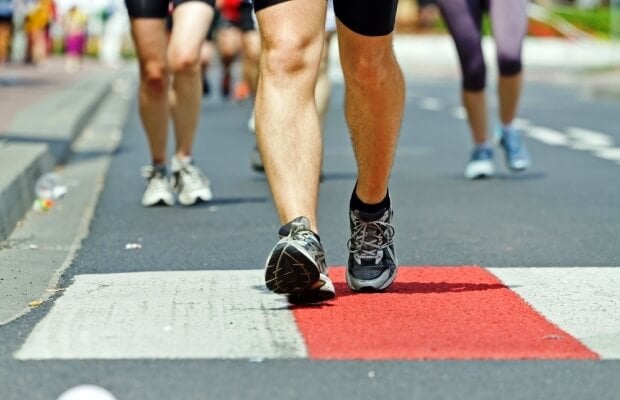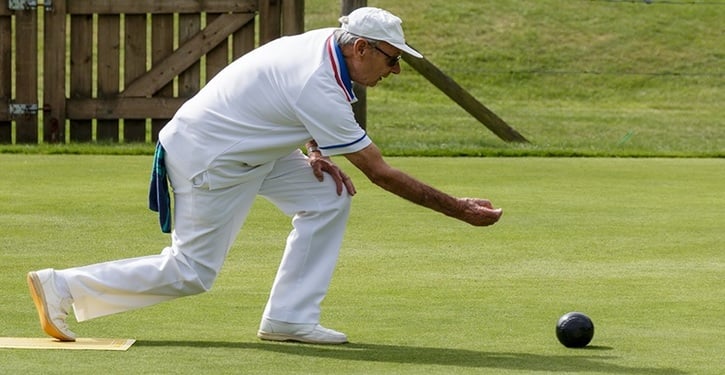The best pre and post-match snacks
Food is fuel – it gives us energy, boosts our immune systems and helps us recover faster after exercise, so knowing what to eat pre- and post-game is vital.
As we get older, we start to hear our joints creak. We feel a twang that tells us we aren’t as nimble as we once were. It’s tempting to sink into an armchair, but life’s all about balance. We know exercise is important, but it needn’t be an endless slog on the treadmill. offer a fun, exhilarating and social solution to getting fit and feeling better.
In later life, our muscles lose strength and flexibility. We’re more prone to losing our balance, bruising and sometimes a more serious injury. But it’s important to remember that exercise helps, not harms. To truly feel the benefits, feeding our bodies the right nutrients is crucial. A good diet builds our strength, reducing the chance of muscle damage. Food is fuel – it gives us energy, boosts our immune systems and helps us recover faster. In turn, we can power down the pitch faster, for longer.
The problem is, with all these ‘fad’ trends and warnings that certain foods may increase the chances of cancer, or heart disease, knowing what to eat can be difficult.
It’s no secret that a balanced diet is the key to a healthy lifestyle – so let’s break it down. Food consists of macronutrients (carbohydrates, fats and proteins) and micronutrients, which we consume in smaller quantities (vitamins and minerals). These convert into energy, helping us perform better when we play sports.
When it comes to exercise, start by focussing on these five foodie rules:
1. Ensure your meal is low fat, low fibre, and moderate in carbs and proteins
2. Drink lots of water
3. Serve a portion that’s the right size for you (so you don’t over-eat or remain hungry)
4. Eat slowly, until satisfied
5. Opt for familiar foods that you know your body can tolerate – pre-exercise is the wrong time to risk something new
Being more aware of the food you’re putting into your body needn’t be a chore, or boring – in fact, you’ll really feel the benefits! Here’s how those all-important macros help our bodies and support an exercise regime.
Carbohydrates, for a pre-game energy boost:
Vegetables, fruits, lentils, beans, nuts and whole grains (e.g. quinoa, brown rice)
Once digested, our bodies break down carbohydrates into a simple sugar (glucose) which is absorbed into the bloodstream. As our sugar level rises, the pancreas releases a hormone called insulin. Insulin moves sugar from the blood into the cells – it’s the sugar that gives us a boost.
Unused glucose is converted to ‘glycogen’ which is stored in the liver and muscles for energy. This needs regularly topping up, otherwise leads to lack of energy, fatigue and slower recovery.
Carbs also supply energy to the brain. If you’re ever feeling low in energy or experiencing ‘brain fog’ (e.g. poor memory or trouble concentrating), eat a piece of fruit. Focus is key to driving your team to success!
Watch out for refined carbs, like fruit juices, pastries, white bread and white pasta, as these are processed with their natural fibre stripped out. This causes blood sugar levels to spike and then crash, leaving you feeling sluggish.
Good fats – protecting your organs before play:
Avocado, eggs, oily fish (e.g. mackerel, salmon, sardines, trout)
Fat isn’t all bad – it protects and insulates vital organs, transports vitamins around the body and provides roughly 70% of energy when we rest and during low-intensity exercise.
Avoid eating foods high in bad fat (like fatty meats or fried food) immediately before or during exercise, as this can cause nausea, vomiting and diarrhoea.
Protein – repair care, post-exercise:
Eggs, chicken breast, milk, tofu, Greek yoghurt
During exercise, we effectively tear muscle fibres apart. Protein helps repair our muscles to build strength, as well as support the immune system. Recovery is just as important as preparation.
Water – it’s nature’s medicine:
Around 60% of your body is water - and it functions as your very own cooling system. Water regulates your body temperature, lubricates your joints, fuels your muscles and transports nutrients through the cells to give you energy.
You lose fluid while exercising (as much as a litre or two an hour!) through sweating and breathing. In turn, your body temperature rises and your heart pumps harder than usual.
The solution? Drink steadily through the day and 500ml of fluid at least four hours before you exercise. In the 10-15 minutes before your session, top up your fluid levels by drinking half this amount again.
Below is a timeline detailing the best foods to eat, and when.
Before exercise...
2 - 4 hours before exercise – maximise the macros:
Make time to eat a meal with all macros, mixing carbs, protein and fat. Enjoy a mix of the below in a meal, or pick a favourite, for a delicious pre-game treat that keeps you fuller, for longer.
The following ingredients make for a delicious pre-match treat to keep you fuller, for longer:
✓ Complex carbs such as whole grains, lentils or quinoa
✓ Lean protein like chicken breast, fish or tofu
✓ Healthy fats like avocado, almond butter, nuts or seeds
✓ A good mix of vegetables
Meal suggestion: A tasty Mexican wrap that’s a whole grain tortilla filled with chicken breast, avocado, sliced tomato and lettuce.
1-2 hours before – carbs and protein, with a little fat:
You have time to eat, but nothing fancy - and excitement means you’re not too hungry anyway. Why not snack on one of the following, or enjoy a tasty combination?
✓ Complex carbs like wholegrain bread, oats, sweet or regular potatoes
✓ Protein like greek yoghurt, cottage cheese, tuna or a hard boiled egg
✓ Salad or fresh vegetables
✓ Keep fat limited to nuts and seeds. If you choose an egg or cottage cheese for protein, this is sufficient
Meal suggestion: Peaches mixed with yoghurt and rolled oats. A sprinkling of cinnamon tops this treat off.
30-60 minutes before – carbs and a little protein:
You’re running low on time, but need a little pick-me-up before your walking sport session. The following snacks should keep you energised:
✓ Fruit like banana, grapes or mango contain easily digestible carbs
✓ Pour non-fat Greek yoghurt over your fruit or enjoy with a glass of milk to ensure you’re getting your lean protein fix
Meal suggestion: Strawberries with non-fat Greek yoghurt - a healthy twist on Wimbledon favourite ‘strawberries and cream’. Banana mixed with milk also makes for a delicious drink on-the-go.
After exercising...
After exercising, eating the right nutrients (carbs and protein especially) will help your body recover and boost your performance in the next session.
Less than 45 minutes after exercising (and no longer than 2 hours):
Remember to eat easily digestible foods within the first hour after exercising. We recommend one of the following light bites:
Starter / snack:
✓ Pitta bread with hummus
✓ Rice cakes with peanut butter
Meal:
✓ Grilled chicken with roasted vegetables
✓ Salmon with sweet potato
Dessert:
✓ Greek yoghurt, berries and granola
✓ Cereal and skimmed milk
Meanwhile, these are post-exercise sins to avoid:
X Sugar-laden protein powders or artificially sweetened shakes
X Processed energy bars
X Salty processed foods
X Fried foods
X Caffeine
Eating well doesn’t mean overhauling your whole diet. It’s about introducing different, delicious foods to meals – a little extra thought into what you’re eating (and when) may give you the energy boost you need to score a goal!

